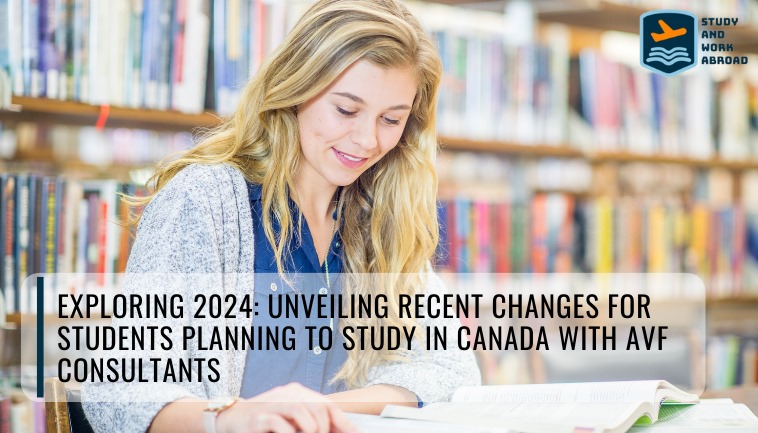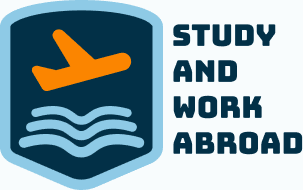Call Us:+91-9920234749, +91-9833420909 info@studyandworkabroad.in

Exploring 2024: Unveiling Recent Changes for Students Planning to Study in Canada with AVF Consultants
In the dynamic field of international education, this comprehensive guide is designed for students contemplating study in Canada and highlights recent changes. Designed specifically for those interested in pursuing an education in Canada, we delve into the latest updates and offer valuable information and commentary on each development. We focus on AVF Consultants, recognized professionals in the field of study consulting in Canada. Our goal is to provide a clear understanding of the evolving educational landscape, ensuring simplicity and professionalism for informed decision making. This guide serves as a trusted resource, particularly for people seeking direct guidance on their aspirations to study in Canada.
1. New GIC Fund requirements:
Immigration Canada has recently implemented substantial changes to the Guaranteed Investment Certificate (GIC) funding requirements applicable to student visas. According to the full ICEF Monitor report(https://shorturl.at/iQ059 ), the GIC fund has seen a significant increase in its provisions.
The GIC, whose value has now doubled, serves as a deposit in the student’s Canadian account under the SDS visa application. Despite initial concerns about a potential increase in expenses, students must recognize that the GIC essentially represents their funds, which they can access upon arriving in Canada. Importantly, this change does not inherently increase the overall cost of studying in Canada. Alternatively, students have the option to explore the Non SDS stream, which exempts them from the GIC deposit requirement.
AVF consultants, with their specialized experience, can guide students through these complexities, providing them with personalized advice to select the most suitable path for their educational journey in Canada.
2. Trusted Institutions Framework:
Another noteworthy development within the Canadian immigration landscape involves the imminent introduction of the ‘Trusted Institutions Framework’ for universities and colleges, scheduled to launch in 2024. This progressive framework is poised to achieve a comprehensive modernization of the student visa program.
The introduction of the Trusted Institutions Framework represents a fundamental step forward, seeking to streamline and improve the overall student visa experience. This innovative framework is designed to meticulously categorise institutions based on various criteria, with the ultimate goal of distinguishing those that consistently provide high-quality education, ensure positive employment outcomes, and boast high visa approval rates.
By offering a structured approach to evaluating educational institutions, the Trusted Institutions Framework serves as a welcome measure to guide prospective students in making well-informed decisions about their academic options. By opting for institutions labeled Trustworthy, students not only align themselves with institutions committed to excellence, but also gain confidence in the trustworthiness of their educational journey.
AVF Consultants, renowned for their deep knowledge of the dynamic educational landscape, are ready to help students identify and navigate through these trusted institutions. Their experience ensures that students receive personalized guidance, empowering them to make decisions aligned with their academic and professional aspirations.
3. Cap on number of study visas:
According to information described in the January 2024 ICEF Monitor article, the Government of Canada has implemented a quota system for the issuance of new study permits. Specifically, this limit is applicable for a period of two years. In particular, the scope of this limitation is explicitly defined: it refers exclusively to diploma courses, with master’s programs being exempt from this restriction.
This regulatory measure has notable implications, particularly for people contemplating the possibility of studying in Canada. The decision to impose a limit on study permits appears to be a strategic measure aimed at regulating the entry of international students, specifically aimed at diploma-level education. For prospective students in regions like Mumbai, where master’s degrees are prevalent, the impact of the new study permit limit is expected to be minimal. The exclusion of master’s programs from this restriction serves as a security point for those wishing to pursue advanced study, thereby maintaining Canada’s appeal as a sought-after destination for higher education.
In short, the cap introduced on study permits, as detailed in the article, reflects a specific approach by the Canadian government. It predominantly affects diploma courses, while safeguarding the status quo of master’s programmes. This nuanced regulatory approach ensures a continued influx of students seeking advanced degrees, aligning with the overall trend of international students opting for higher levels of education in Canada.
4. Restrictions to PGWP:
A major revelation has recently emerged that sheds light on the imposition of restrictions specifically targeting the Postgraduate Work Permit (PGWP) for students, with particular emphasis on its impact on diploma courses.
The aforementioned restrictions on PGWP are particularly applicable to diploma holders studying at colleges with public-private partnerships. However, it is essential to note that this restriction has a positive counterbalance: the expansion of PGWP opportunities for students enrolled in master’s programs. This remarkable development not only reinforces the attractiveness of pursuing advanced degrees but also underlines the instrumental role played by specialized international educational agencies, such as Study And Work Abroad AVF Consultants.
In navigating this changing immigration policy landscape, agencies like Study And Work Abroad AVF Consultants show their competence and commitment to helping students. Their experience extends beyond facilitating admissions, encompassing comprehensive support in obtaining visas and navigating the complexities of updated PGWP regulations. This commitment ensures that students, especially those pursuing master’s degrees, can confidently pursue their academic and professional aspirations within the confines of the evolving regulatory framework.
5. Open Work Permit Restriction for Spouses:
Recent announcements from the Canadian government mark a significant change in policies affecting international students. A temporary cap on new study permits, applied for 2024 and 2025, is expected to result in a substantial 35% reduction in permits issued compared to 2023 levels. This measure, described as a temporary measure, reflects Canada’s strategic approach to managing the influx of international students.
In addition to the cap, impacting changes include the discontinuation of graduate work permits for students enrolled in programs delivered through public-private partnerships, effective September 1, 2024. This alteration adds complexity to graduate options for international students participating in collaborative programs. Additionally, limitations on open work permits for spouses of international students introduce new considerations for families, highlighting the broader implications of these policy changes.
However, amid these restrictions, there is a positive note for graduate students in Canada. The government is expanding postgraduate work rights, allowing those who complete postgraduate studies to apply for a three-year postgraduate work permit. This expansion not only enhances the attractiveness of pursuing advanced degrees in Canada but also provides greater opportunities for international students to gain valuable work experience, aligning with the nation’s commitment to supporting qualified professionals in the workforce.
Conclusion:
In conclusion, staying abreast of these recent developments is vital for students planning to study in Canada. By incorporating these details and insights into our blogs, focusing on the expertise of AVF Consultants, we aim to provide students with a comprehensive understanding of the changing landscape, allowing them to make well-informed decisions for their educational journey in Canada. Stay tuned for more updates and insights as the international education landscape continues to evolve.
